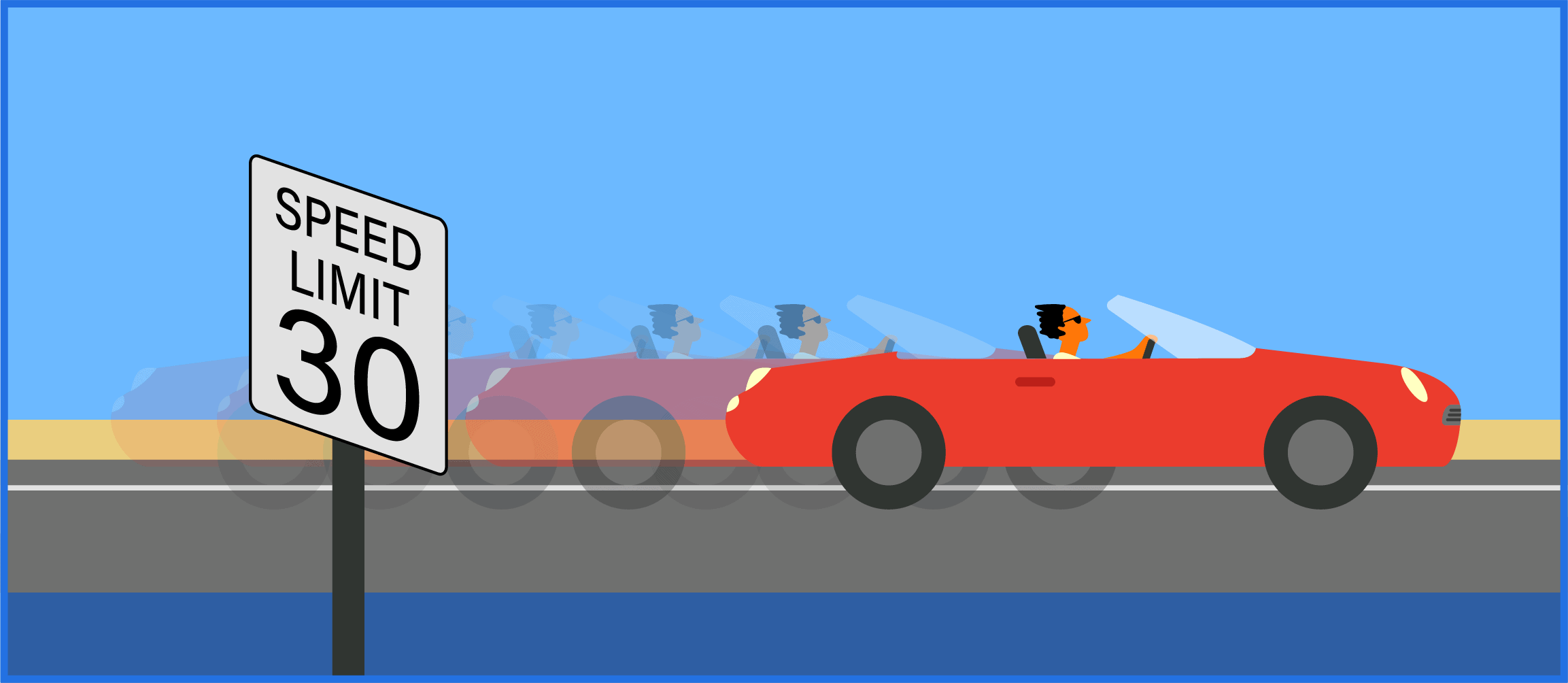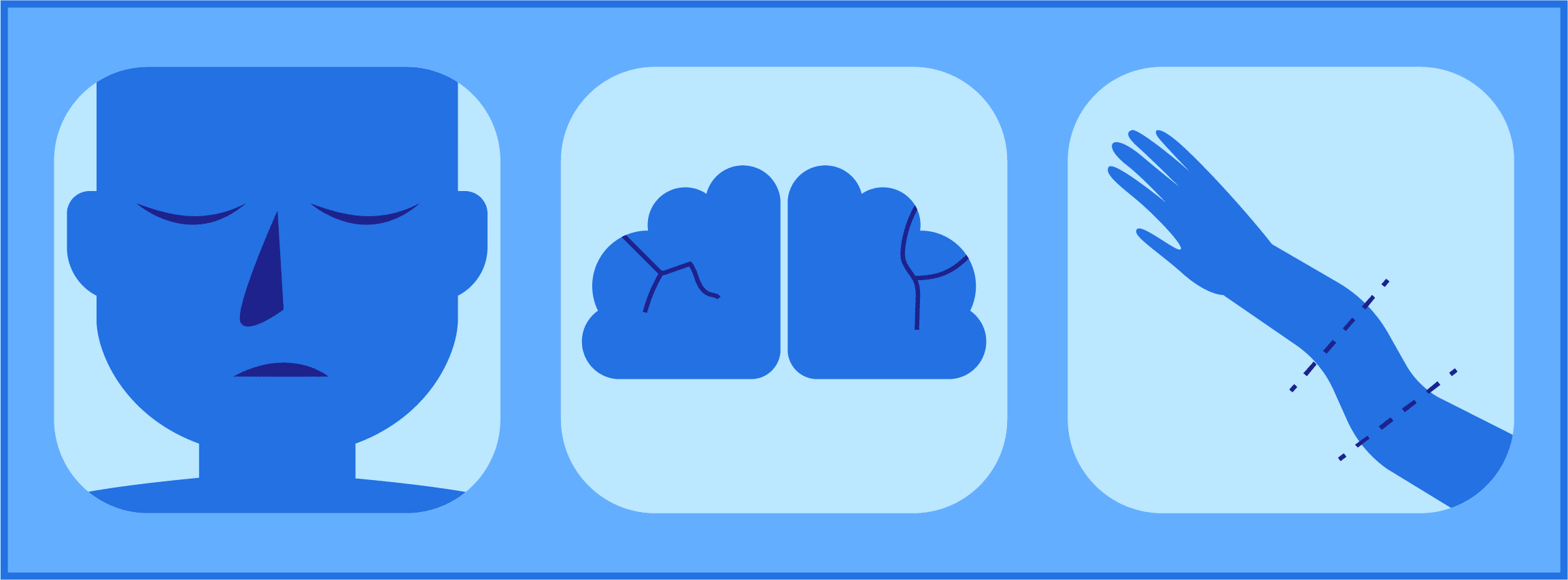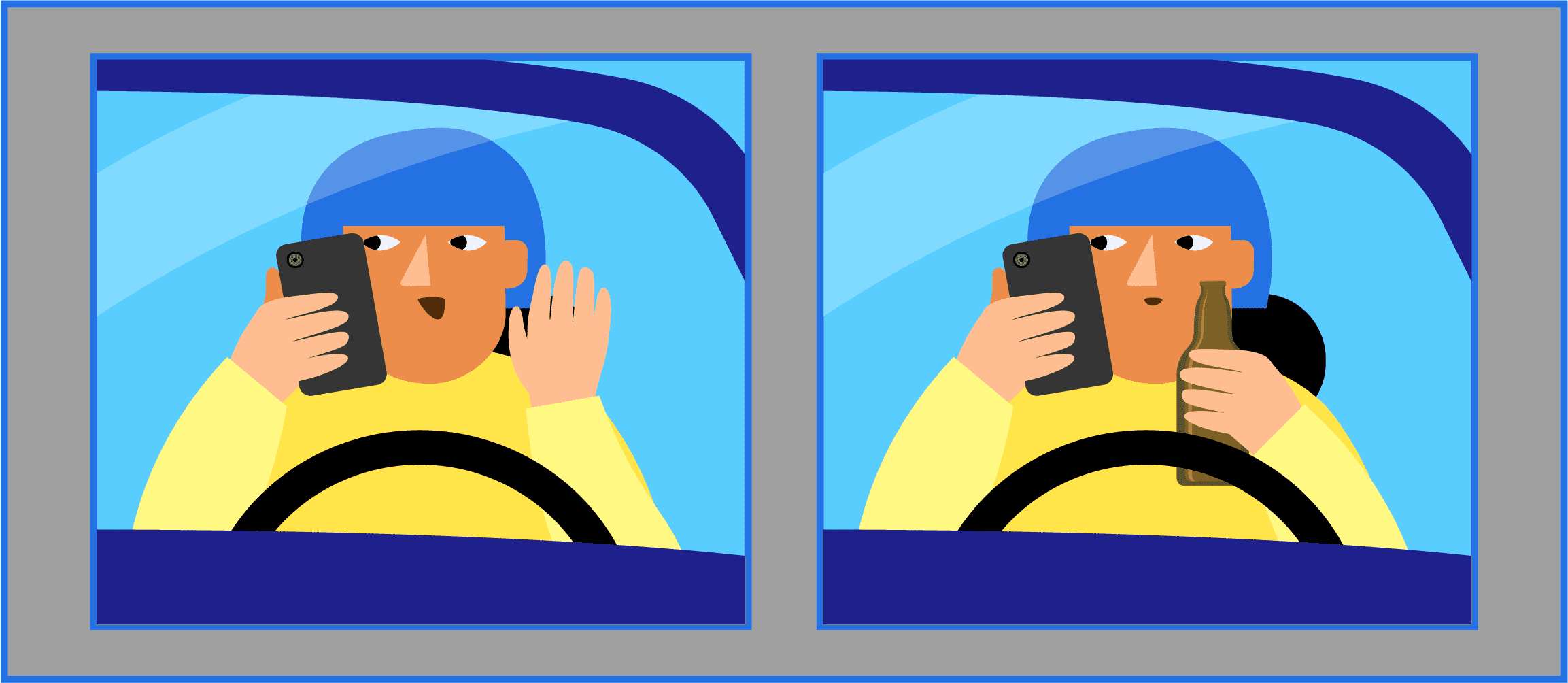Have you been pulled over for excessive speeding, passing on blind curves, or running a red light? Then you might be charged with reckless driving, a major traffic violation.
California law defines reckless driving as the act of operating a motor vehicle with willful disregard for other people’s safety or property. This traffic offense is classified as a misdemeanor and, therefore, carries more severe penalties than an infraction.
Here’s everything you need to know about reckless driving in California, including its implications, common defenses, and other aspects.
What Is Reckless Driving in California?
In California, reckless driving involves operating a vehicle carelessly in a manner that shows a lack of regard for the safety of other road participants. It also covers cases where a driver’s behavior demonstrates intentional disregard for other people’s property, such as their cars or houses.
Note that you can be charged with reckless driving even when you’re not on public roads. The law applies to private roads and off-street parking facilities, too.
Traffic school can help you keep a clean driving record, prevent insurance increases, and more!
Examples of Reckless Driving

Some examples of behavior that can result in a California reckless driving charge include:
- Ignoring traffic signs or signals
- Excessive speeding
- Aggressive driving
- Drag or street racing
- Driving too fast for road conditions
- Driving too fast in a school zone
- Using a cell phone while driving
- Applying makeup while driving
- Tailgating
- Brake checking
- Blocking other drivers attempting to change lanes or pass
- Driving on the sidewalk
- Driving on the wrong side of the road
- Going the wrong way down a one-way street
- Passing illegally, including passing on a curve or grade, at a railroad crossing, or passing a stopped school bus
- Swerving across lanes
- Weaving in and out of traffic
- Intentionally driving a vehicle that is improperly equipped (e.g., defective brakes or lights)
- Driving with an obstructed view
- Daredevil behaviors
In 2019, the California Highway Patrol and the University of California, Berkeley, conducted a survey on unsafe driving behaviors. About one-third of respondents said they witnessed a car crash due to aggressive driving, one of the most common forms of reckless driving.
Read: Texting and Driving Statistics
Is Speeding Reckless Driving?

California law doesn’t specify the exact speed that constitutes reckless driving. It all depends on the circumstances of your driving behavior.
For example, you can exceed the speed limit by just 10 mph and still be charged with reckless driving if you’re weaving through traffic or texting behind the wheel. However, if you were only driving quickly and not exhibiting otherwise reckless behavior, a reckless driving charge may not hold up.
Reckless Driving Convictions: The Consequences

Reckless driving is a misdemeanor with serious legal implications. In California, penalties can include:
- Fines
- Points on your license
- Increased insurance rates
- License suspension
- Vehicle impoundment
- Missed career opportunities
- Civil liability
Let’s take a closer look.
Fines
A reckless driving charge carries a fine of $145 to $1,000. That’s a significantly higher fine than many other violations.
Jail Time
In California, reckless driving that results in bodily injury to another person is addressed under Section 23104 of the California Vehicle Code. This offense is typically classified as a misdemeanor, punishable by:
- Imprisonment: Up to six months in county jail
- Fines: Up to $1,000
However, if the reckless driving causes great bodily injury – defined as significant or substantial physical injury – the offense becomes a “wobbler.” This means it can be prosecuted either as a misdemeanor or a felony, depending on factors such as the severity of the injury and the driver’s prior criminal history.
Misdemeanor Penalties for Great Bodily Injury:
- Imprisonment: Up to one year in county jail
- Fines: Up to $1,000
Felony Penalties for Great Bodily Injury:
- Imprisonment: 16 months, two years, or three years in state prison
- Fines: Up to $10,000
Additionally, a felony conviction may lead to formal probation and a permanent felony record.

Driving in a way that is likely to cause injury to others can also result in charges of assault with a deadly weapon, which carries two to four years in prison. This could happen if you deliberately drive at a pedestrian or cyclist.
Alcohol-related reckless driving can result in an additional one to two years of probation, as well as mandatory treatment programs. Penalties can also be increased if you have previous convictions for reckless driving.
When reckless driving does not result in injury, it is not typically punishable by jail time. In such cases, you may be able to avoid imprisonment by doing probation, or completing community service, or traffic school.
This is all at the judge’s discretion, though. There is no automatic traffic school approval for reckless driving, regardless of the context.
Points on Your License
The base penalty for reckless driving is two points on your license. If you’re found guilty of reckless driving, the points will remain on your license for up to 10 years, during which you’ll pay higher auto insurance premiums.
These points add up over time and may result in license suspension or revocation. See our guide to the California DMV point system to find out more.
Increased Insurance Rates
A reckless driving ticket can raise your car insurance rates by around 184%.
This means if you normally shell out $1,713 for auto insurance per year, you may end up paying $4,867 (184% more). The exact increase depends on your driving record, insurance carrier, and other factors.
License Suspension

In California, reckless driving and other traffic misdemeanors carry two demerit points. The DMV may suspend your driver’s license if you accumulate:
- 4 or more points within 12 months
- 6 or more points within 24 months
- 8 or more points within 36 months
So, if you already have two points on your record for minor offenses and get another two points for reckless driving within one year, you may lose your license.
The DMV will issue a warning letter or notice of intent before taking action against you. This should leave you enough time to improve your record – or at least serve as a heads-up and prevent you from making further mistakes.
Once you receive a Notice of Intent to Suspend, it’s important to act quickly, either by attending a DMV hearing, attending traffic school, or paying any outstanding fines.
The court can suspend your driving privileges, too. This is at the discretion of the judge, who will consider your driving history and the circumstances of your case.
Based on these factors, you may have to surrender your license for:
- Up to 30 days if you’re found guilty of reckless driving for the first time
- Up to 60 days for a second reckless driving conviction
- Up to six months for a third reckless driving conviction
Vehicle Impoundment
The police may impound your car if you drive recklessly and cause a serious injury to another person. In such cases, you also risk being charged with a felony.
Missed Career Opportunities
A reckless driving conviction will show up on background checks, hindering your chances of finding work. It could also cause you to lose your job or affect your security clearance (e.g., if you’re a government employee or a member of the military).
Civil Liability
If your behavior behind the wheel causes an accident, you may be held liable for damages. Be prepared to cover the victim’s medical bills, funeral expenses, or other costs, such as the income lost during their recovery.
Read: Is It Illegal to Drive Barefoot?
What Happens If You’re Caught Driving Recklessly in California?
When you’re pulled over for reckless driving, the police can issue a moving citation or take you into custody. The more dangerous your behavior (e.g., drag racing), the more likely you are to be arrested and have your car impounded.
Next, you’ll be required to appear in court to address the charges. Since reckless driving is a major violation, consider hiring a traffic lawyer to defend you.
The judge will review your case, make a verdict, and then impose a fine and other penalties. Even if your case is dismissed, you may still have to pay certain court fees – depending on the jurisdiction.
The court may also order traffic school as part of a plea deal (that’s where a traffic attorney can help!) or agreement. This option may also be available to first-time offenders and people convicted of reckless driving without aggravating circumstances, such as property damage or bodily injury.
Be aware that missing your court date can lead to additional charges, such as failure to appear. If that happens, the judge may issue a warrant for your arrest and impose a $100 civil charge, among other penalties.
Offenses Related to Reckless Driving in California
Some traffic offenses, such as DUIs and excessive speeding, may constitute reckless driving under certain circumstances. Others represent aggravating factors and can result in harsher penalties.
Let’s see a few examples and what they entail.
Reckless Driving Resulting in Serious Injuries
This traffic violation is covered by Section 23105 of the CVC and may result in a fine of $220 to $1,000 and/or 30 to 180 days of jail time.
Serious injury, in the context of reckless driving law in California, includes any of the following:
- Concussion
- Brain injury
- Loss of consciousness
- Fracture
- Wounds that require extensive suturing
- Protracted loss or impairment of function of an organ or body part
- Serious disfigurement
- Paralysis
Wet Reckless

In California, there are two types of reckless driving: “wet,” which involves alcohol, and “dry,” which does not involve alcohol. Wet reckless falls under Section 23103.5 of the CVC.
A “wet reckless” conviction is a common plea bargain for someone who is originally charged with a DUI. Its legal consequences may include a fine of $145 to $1,000 and up to 90 days in jail, plus two points on your driving record. This conviction carries lesser penalties than a first-time DUI, which carries fines of $390 to $1,000 and up to six months in jail, among other penalties.
For instance, the court may reduce your DUI to a wet reckless conviction if you have no prior history of driving under the influence and your blood alcohol content (BAC) was relatively low, such as 0.05%.
Read: Drunk Driving Statistics
Street Racing and Exhibitions of Speed
Section 23109 of the CVC prohibits drivers from engaging in speed contests or exhibitions of speed, such as drifting around corners or accelerating too fast.
This kind of behavior may constitute reckless driving and is punishable by a fine of $355 to $1,000. You may also have your driver’s license suspended and receive up to 90 days of jail time. Plus, the police may seize your car for up to 30 days.
The penalties are even more severe if you cause bodily injury to another person.
Driving Under the Influence
DUIs and reckless driving go hand in hand, but they are different offenses.
DUIs are covered by Section 23152 of the CVC and can result in a fine of $390 to $5,000 and up to three years of jail time, depending on its severity and whether you’re a first-time or repeat offender. You’ll also lose your driving privileges for four months to one year or longer (if you refuse a breath or blood test).
Excessive Speeding
Excessive speeding in itself does not necessarily count as reckless driving. Speeding is addressed by Sections 22348 – 22431 of the CVC and carries different penalties than reckless driving. However, there are cases where these traffic offenses may overlap.
For instance, the court may find you guilty of reckless driving if you were caught speeding 75 mph in a school zone or residential area with a 25 mph speed limit. This kind of behavior shows a blatant disregard for traffic laws and the safety of pedestrians.
Defenses for Reckless Driving

The legal bar for being convicted of reckless driving is pretty high. California law states that a driver must understand that their behavior creates an unjustifiable risk of injury or property damage and choose to engage in that behavior anyway.
That means there must be evidence of intent to break the law in a reckless driving conviction. Without intent, violating traffic laws can be simply due to negligence – or even gross negligence.
With that in mind, there are three common defenses used by drivers who are charged with reckless driving:
Someone Else Was Driving the Vehicle
The prosecutor must prove that you were the one driving at the time of the offense. You cannot be charged with reckless driving if a passenger or someone else was behind the wheel.
This defense can also be used if, for example, you’re accused of reckless driving due to a red light camera, but someone else was driving your car at the time.
You Were Not Acting Recklessly
The prosecutor on a reckless driving case must prove beyond a reasonable doubt that the driver showed a “wanton disregard for safety.” If you can prove that you were not intentionally ignoring a risk of harm while driving, that can be a defense against a reckless driving charge.
Let’s assume you were setting up your GPS system or radio at the time of the violation.
In this scenario, your attorney could prove that you were distracted or negligent, but not reckless. Most actions that constitute distracted driving are subject to less severe penalties than reckless driving.
Your Driving Behavior Was Necessary or Justified
The law states that reckless driving must be “unjustifiable,” so another possible defense is that your behavior behind the wheel was necessary or justified.
For example, you may explain that you swerved or accelerated to avoid an imminent collision. Or maybe you were speeding because a passenger got sick and required emergency care, so you needed to get him to the hospital immediately.
In such cases, you may still face legal repercussions (e.g., a speeding ticket), but the penalties will be less severe than those for reckless driving.
Get the Conviction Expunged from Your Record
If you’re found guilty of reckless driving, you can petition for an expungement after paying the fine and completing the sentence received. You must also prove that you’re in good standing with the law.
An expungement will seal the conviction from your record and public court files, reducing its impact on your life and career.
This legal process requires extensive paperwork and is not available to everyone. For instance, you may not petition for an expungement if you served time in prison. Ask an attorney to review your case and help you decide on the best course of action.
Final Thoughts
Reckless driving is a serious offense that can affect nearly every aspect of your life. You could lose your job, serve time in prison, and have your driver’s license suspended.
One way to minimize its impact is to complete a traffic school course. The judge may give you this option in lieu of paying a fine or facing more severe penalties.
Traffic school won’t mask the points associated with reckless driving, but it may reduce the charges against you. A good lawyer could persuade the judge to allow you to attend traffic school, so don’t hesitate to seek legal help.
FAQs about Reckless Driving in California
Looking for more information? Below are the answers to some common questions about reckless driving in California.
What speed is considered reckless driving in California?
There is no specific speed that constitutes reckless driving in California.
During your trial, the judge will review your behavior (and not just your speed) at the time of the offense. For example, you may be charged with reckless driving if you were speeding and weaving through traffic.
How long does a reckless driving conviction stay on your record in California?
A reckless driving conviction will impact your record for up to 10 years, depending on its severity.
Is reckless driving a felony or a misdemeanor in California?
Per California law, reckless driving is a misdemeanor, but it can turn into a felony if your actions result in bodily injury or death.
What’s the penalty for first-time reckless driving in California?
The penalties for a first-time reckless driving conviction may include a fine of $145 to $1,000 and five to 90 days of jail time. You’ll also have your driver’s license suspended for up to 30 days.
Be aware that you’ll face harsher consequences if your driving behavior causes bodily harm or property damage. For example, you may get more jail time and be required to pay compensation to the victim.
How many points do you get on your license for reckless driving in California?
This traffic violation will add two points to your driving record.
What happens when you report a reckless driver in California?
Reckless drivers reported to the California Highway Patrol or DMV may receive a warning letter and potentially face legal consequences. The outcome depends on the evidence against them.
